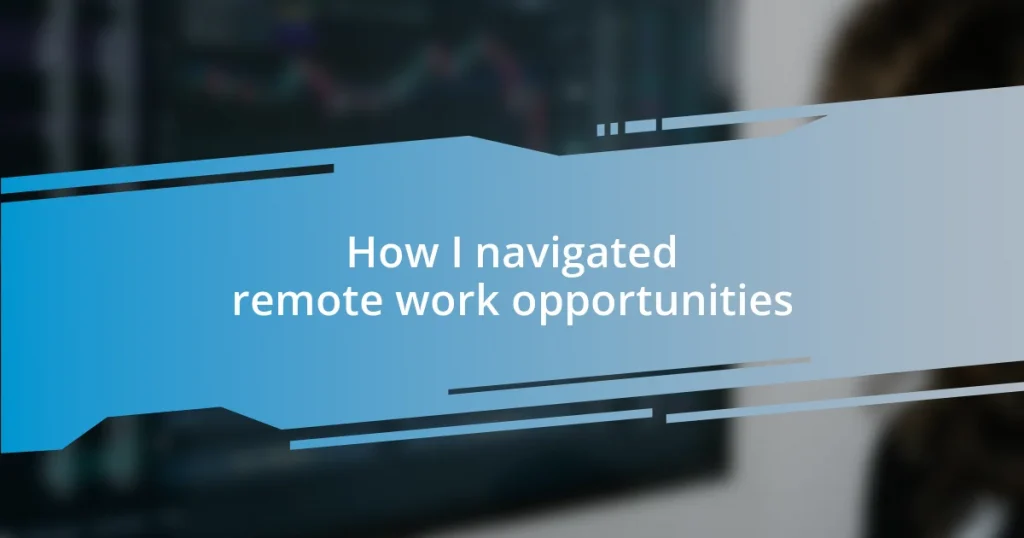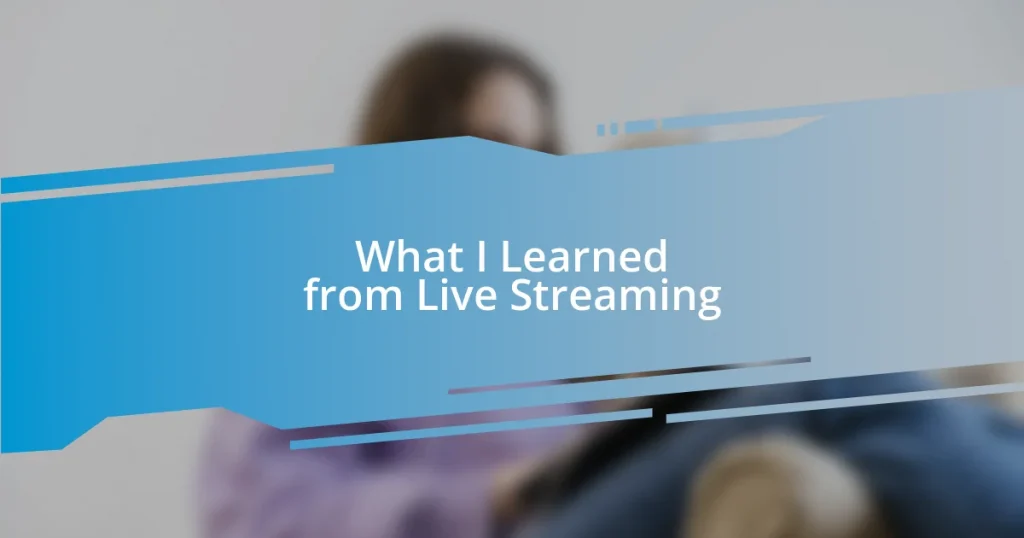Key takeaways:
- Remote work offers significant flexibility and eliminates commuting, leading to better work-life balance and financial savings.
- Effective job searching for remote roles includes utilizing niche job boards, company career pages, networking, and freelance platforms.
- Building a productive remote workspace and staying connected with colleagues are essential for maintaining motivation and work efficiency.
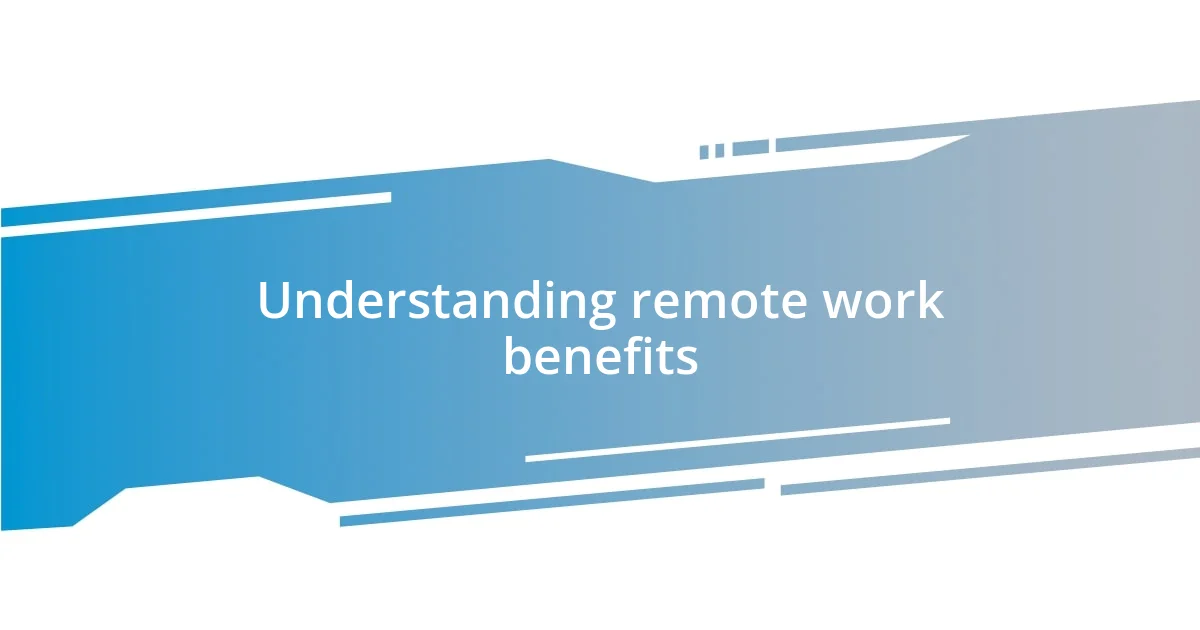
Understanding remote work benefits
One of the most surprising benefits I discovered while embracing remote work was the flexibility it offered. I remember the first time I realized I could attend my daughter’s school play without worrying about requesting time off; it felt liberating. Isn’t it amazing how that little shift can transform not just your schedule but your entire mindset?
Another key advantage of remote work is the reduction in commuting time. I used to spend over an hour each day stuck in traffic, and all that wasted time added up. Once I transitioned to a remote setup, I reclaimed those hours for myself—whether that meant diving into a new hobby or simply enjoying a leisurely breakfast. How often do we undervalue those moments we can take back?
Lastly, working remotely can lead to significant financial savings. I used to spend a small fortune on lunches and coffee runs at the office. Now, I can whip up a nutritious meal at home and save that money for things that matter more. It truly makes you rethink how you allocate your resources! Have you ever considered how much your daily habits cost you?
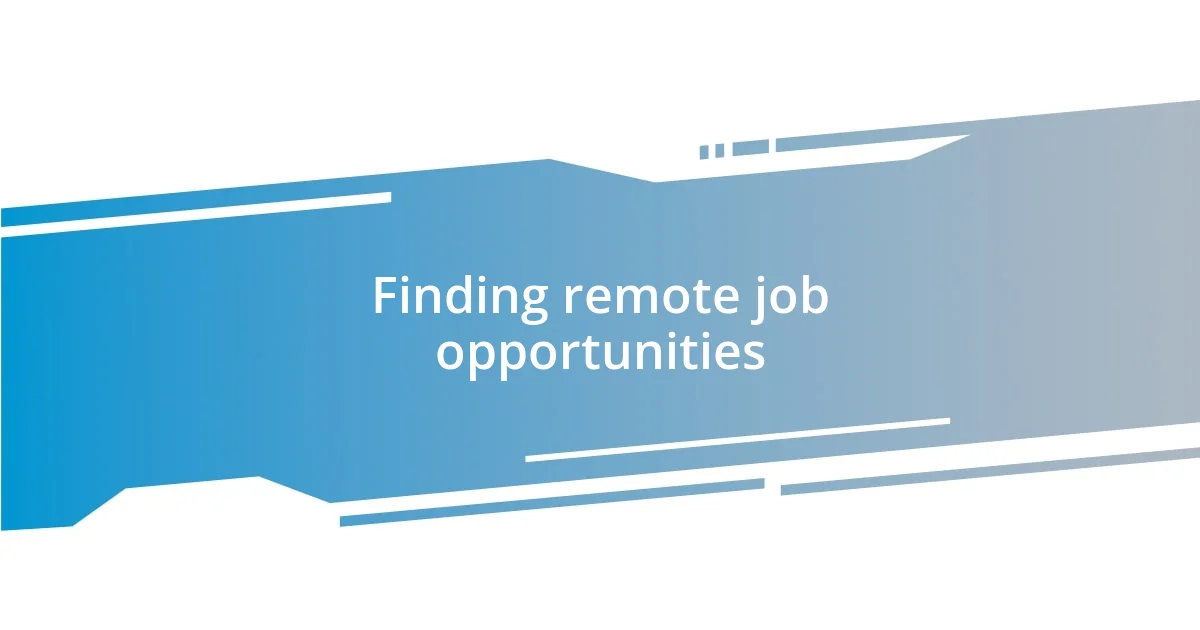
Finding remote job opportunities
Finding remote job opportunities can feel overwhelming at times, but I’ve found that a few strategies can really streamline the process. I remember the countless hours I spent scrolling through job boards, often feeling lost and frustrated. It wasn’t until I narrowed my search to niche websites tailored for remote work that I started to see real results. Focusing on specialized platforms brought me opportunities that matched my skills perfectly.
When diving into the search, I recommend considering these resources:
- Remote job boards: Websites like We Work Remotely, Remote.co, and FlexJobs cater exclusively to remote positions.
- Company career pages: Many companies openly list remote roles on their own sites, so go directly to the source.
- Networking: Engage with online communities on LinkedIn, Facebook groups, or specialized forums. You never know when a connection might lead to your next opportunity.
- Freelance platforms: Sites like Upwork and Freelancer can help you find short-term gigs that can lead to long-term remote work.
By mixing these strategies, I not only found positions that fit my expertise but also connected with people who inspired and motivated me throughout my journey. It’s interesting how sometimes a simple nudge in the right direction can open doors you didn’t even know existed.
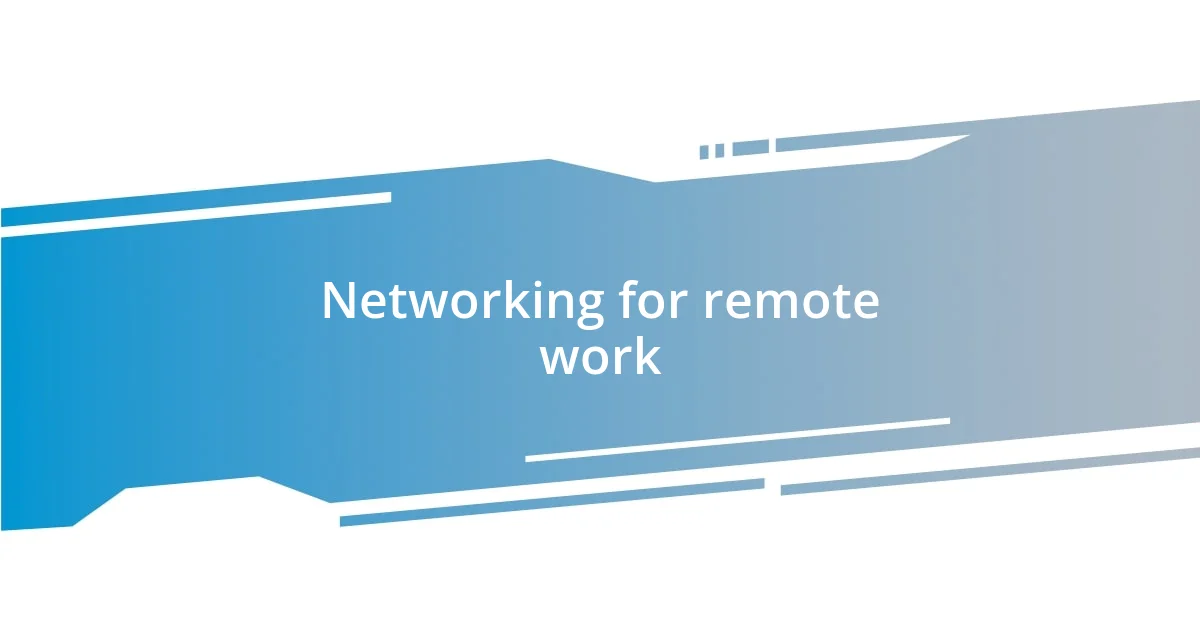
Networking for remote work
Networking for remote work is a game-changer, and I speak from experience when I say that it’s not just about who you know, but how you connect with them. I remember attending a virtual conference where I hesitated to introduce myself, thinking no one would care. But once I hit ‘send’ on my message in the chat, the responses surprised me. That single interaction led to valuable connections that have continued to grow even after the event ended. Isn’t it fascinating how one small step can lead to unexpected opportunities?
Another strategy that worked wonders for me was engaging in industry-related online groups. Finding a Facebook group dedicated to my field turned out to be a treasure trove of knowledge. Members regularly shared job openings and offered insights into companies’ remote work cultures. The first time I landed an interview after posting my resume there, I felt a rush of hope and excitement. How do communities like this shape our careers? From my perspective, they empower individuals to share resources that can be pivotal in navigating the remote work landscape.
Lastly, I found that leveraging LinkedIn has been incredibly fruitful for expanding my network. By actively participating in discussions, sharing articles, and reaching out to professionals in my desired field, I built a sense of connection despite the physical distance. Each time I connected with someone new, I felt like I was adding another piece to my professional puzzle. How many valuable insights are you missing out on by not engaging online? Trust me, a little initiative can lead to transformative relationships and, ultimately, remote work success.
| Method | Description |
|---|---|
| Virtual Conferences | Engage with attendees and speakers to form connections and open doors for future opportunities. |
| Online Groups | Join industry-specific groups to share job leads and get insights directly from peers. |
| LinkedIn Engagement | Actively participate in discussions to build a professional network and tap into shared knowledge. |
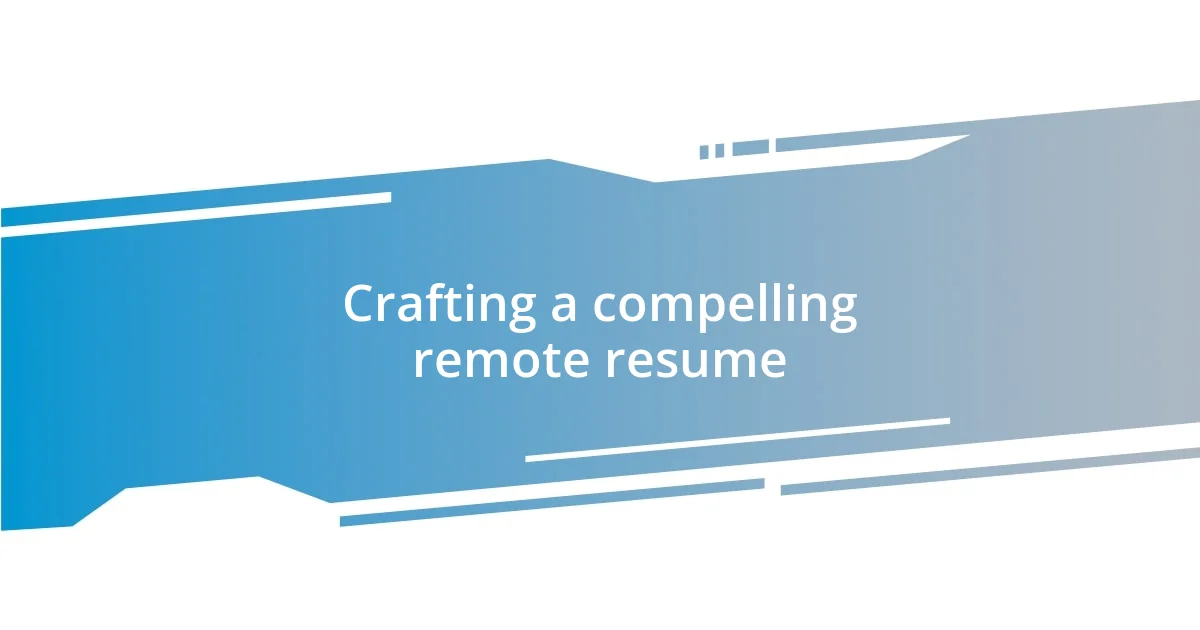
Crafting a compelling remote resume
Crafting a compelling remote resume means showcasing your skills and experiences in a way that’s tailored to the remote work environment. I remember the first time I realized that a traditional resume just didn’t cut it for remote roles; I had to highlight my ability to work independently and communicate effectively online. What did I do? I shifted the focus from just listing my job duties to emphasizing achievements that illustrated my adaptability and collaboration in virtual settings.
One effective strategy that worked wonders for me was incorporating specific metrics into my resume. For instance, instead of saying I “managed a team,” I proudly noted that I “led a remote team of five, resulting in a 30% increase in project efficiency.” This kind of detail not only captures attention but also provides solid evidence of my impact. Isn’t it interesting how numbers can tell a story that words sometimes can’t? By quantifying my contributions, I instilled confidence in potential employers that I could thrive in a remote capacity.
Lastly, I found that personalizing my resume for each application was a game-changer. I vividly recall spending an afternoon revising my resume for a position I was truly passionate about. I tailored my summary to reflect the company’s values and mission, weaving in keywords from the job description that resonated with me. By connecting my experiences with their needs, I felt a surge of hope. How often do we overlook that personal touch? I learned that making my resume speak directly to the employer’s culture and expectations could mean the difference between being overlooked and landing that coveted interview.
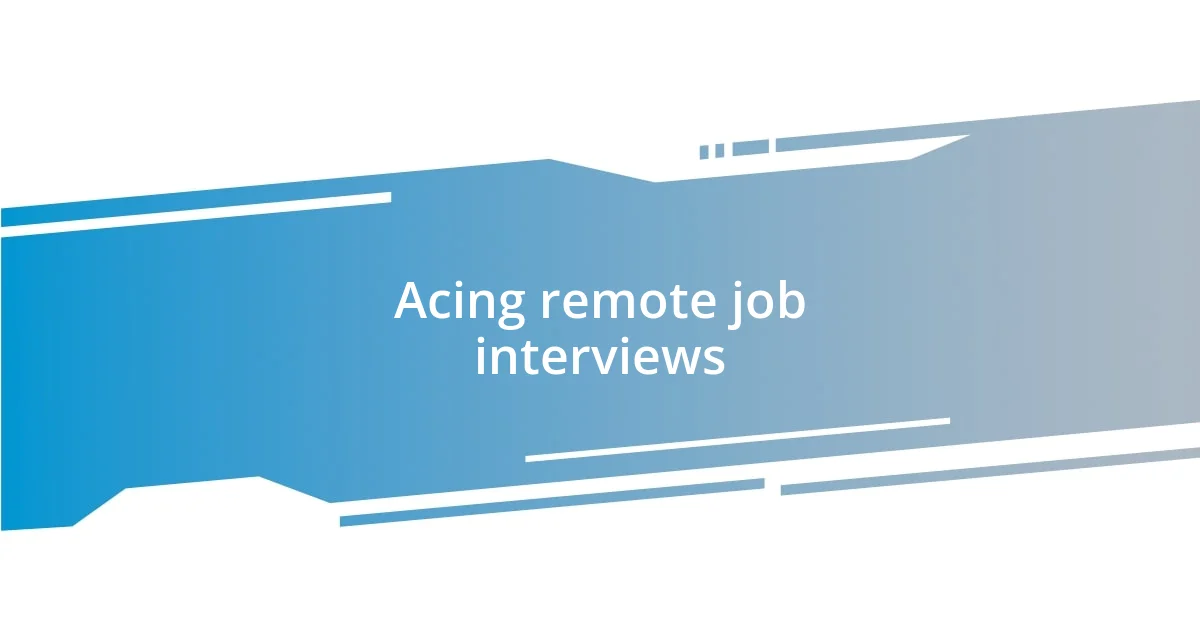
Acing remote job interviews
Preparing for remote job interviews can feel daunting, but I’ve learned that a few strategies can really help you stand out. One time, I joined a mock interview session specifically designed for virtual roles. It was eye-opening to receive immediate feedback on my camera presence and communication style. Who knew that minor things, like lighting or distractions in the background, could make such a difference? That experience taught me the importance of creating a professional environment even in the comfort of my own home.
When it comes to articulating my experiences during interviews, I’ve found that storytelling resonates well with interviewers. I recall an instance where I shared a challenge I faced while managing a remote project and how I overcame it by implementing a new collaboration tool. The interviewer seemed genuinely engaged, nodding along as I recounted the story. Not only did it showcase my problem-solving skills, but it also painted a vivid picture of my work style. How often do we underestimate the power of a good story in a professional setting?
Lastly, mastering the art of follow-up has been invaluable for me. After one particularly good interview, I sent a brief thank-you email, reiterating my excitement about the opportunity and mentioning a specific conversation point we had. A few days later, I received a reply that mentioned how much they appreciated my thoughtful follow-up. This practice not only keeps your name fresh in the interviewer’s mind but also shows your genuine interest in the role. Isn’t it amazing how a simple gesture can leave a lasting impression?
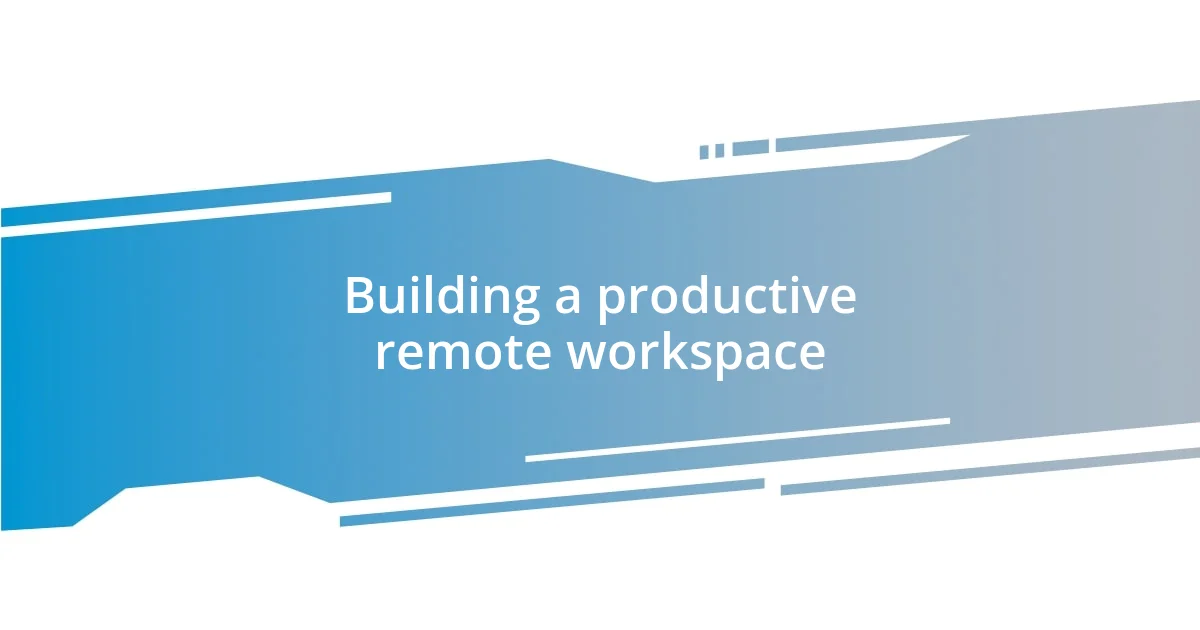
Building a productive remote workspace
When it comes to building a productive remote workspace, I can’t stress enough the importance of having a dedicated area. I remember feeling distracted working from my couch, often succumbing to the temptation of naps. So, I carved out a little nook in a quiet corner of my home, complete with a desk and comfortable chair. It made a world of difference—it helped signal to my brain that it was time for work. Have you ever noticed how just changing your environment can shift your mindset?
Ergonomics also played a key role in my productivity. Initially, I shrugged off the need for a proper chair and desk setup, thinking I could just make do. After a few weeks of hunching over my laptop, my back cried out for mercy. Investing in an adjustable chair and setting my screen at eye level not only eased my discomfort but also energized me to tackle tasks with renewed focus. Isn’t it funny how we sometimes overlook our physical well-being until it affects our work?
Additionally, I found that surrounding myself with inspiring elements truly enhances my space. I hung up a few motivational quotes and even added some indoor plants. The greenery not only brightened my environment but also brought a sense of calm and joy. Every glance at my workspace reminded me of my goals and aspirations. Have you ever thought about how small changes can have a big impact on your overall motivation while working remotely?
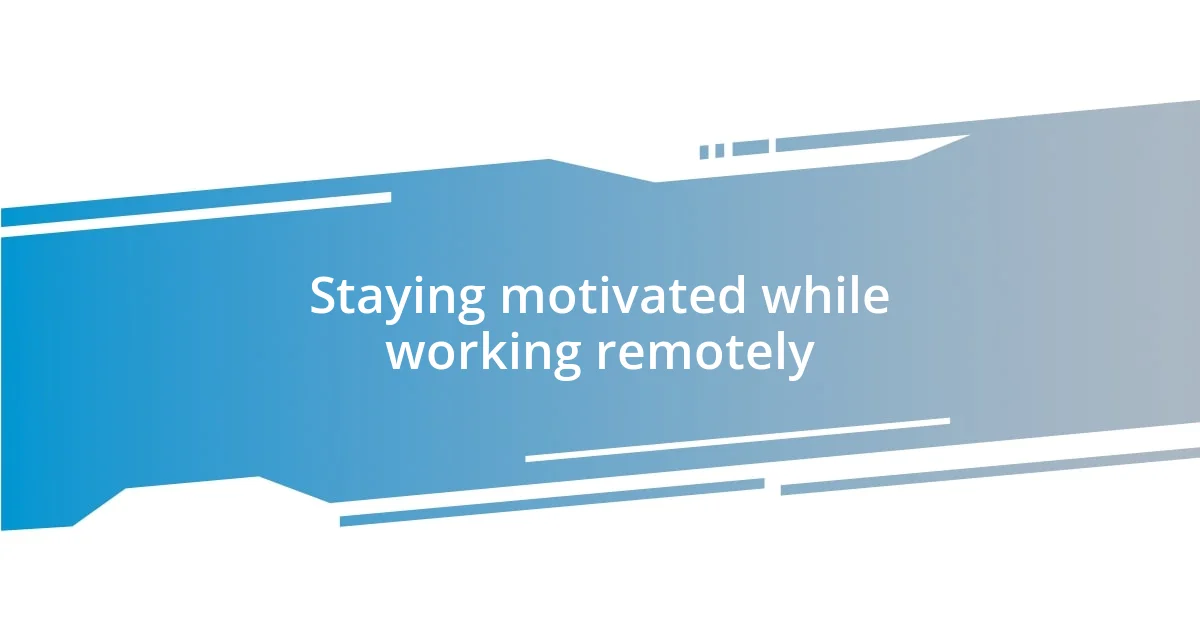
Staying motivated while working remotely
Staying motivated while working remotely can sometimes feel like a challenge. I remember a period when I struggled to find that drive, often feeling overwhelmed by the distractions at home. One day, I decided to start each morning with a quick 10-minute routine, which helped me transition into work mode. I’d stretch, sip my coffee slowly, and jot down my top three goals for the day. It was a simple yet effective way to frame my mindset—have you ever tried setting daily intentions to ignite your motivation?
Another tactic that really made a difference for me was scheduling regular breaks. At first, I’d sit for hours, thinking I’d be more productive if I just powered through. But I soon realized that stepping away, even for a short walk around the block, cleared my mind and boosted my energy levels. During one of those breaks, I noticed how simply getting outside and inhaling fresh air awakened my senses. Isn’t it fascinating how a few moments of nature can refresh our spirits?
Lastly, I found that connecting with colleagues helped maintain my motivation. I initiated weekly virtual coffee chats, where we could share not just work updates but also our personal challenges and victories. It was a revelation; learning that others experienced similar feelings made me feel less isolated. I still remember laughing over someone’s hilarious Zoom mishap and how those light-hearted moments made the remote experience so much more enjoyable. Have you thought about how building community, even virtually, can uplift us through the remote work journey?











